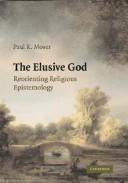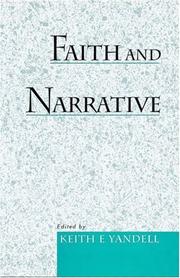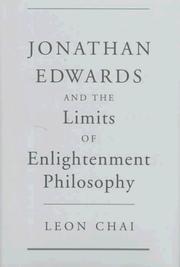| Listing 1 - 10 of 107 | << page >> |
Sort by
|
Book
ISBN: 1009203568 1009203533 100920355X 1009203584 Year: 2023 Publisher: Cambridge, United Kingdom ; New York, NY, USA : Cambridge University Press,
Abstract | Keywords | Export | Availability | Bookmark
 Loading...
Loading...Choose an application
- Reference Manager
- EndNote
- RefWorks (Direct export to RefWorks)
In this book, Roberto Di Ceglie offers an historical, theological, and epistemological investigation exploring how commitments to God and/or the good generate the optimum condition to achieve knowledge. Di Ceglie criticizes the common belief that to attain knowledge, one must always be ready to replace one's convictions with beliefs that appear to be proven. He defends a more comprehensive view, historically exemplified by outstanding Christian thinkers, whereby believers are expected to commit themselves to God and to related beliefs no matter how convincing the evidence contradicting such beliefs appears to be. He also argues that both believers and unbelievers can commit themselves to God and the good, respectively, thereby creating a spiritual turn in epistemology that enables them to generate the best possible condition for conducting rational enquiries and discussion.
Knowledge, Theory of (Religion) --- Epistemology, Religious --- Religious epistemology --- Religious knowledge, Theory of --- Religion --- Theology, Doctrinal --- Philosophy
Book
ISBN: 9781009203531 9781009203555 9781009203548 1009203568 1009203533 Year: 2023 Publisher: Cambridge, United Kingdom ; New York, NY, USA Cambridge University Press
Abstract | Keywords | Export | Availability | Bookmark
 Loading...
Loading...Choose an application
- Reference Manager
- EndNote
- RefWorks (Direct export to RefWorks)
In this book, Roberto Di Ceglie offers an historical, theological, and epistemological investigation exploring how commitments to God and/or the good generate the optimum condition to achieve knowledge. Di Ceglie criticizes the common belief that to attain knowledge, one must always be ready to replace one's convictions with beliefs that appear to be proven. He defends a more comprehensive view, historically exemplified by outstanding Christian thinkers, whereby believers are expected to commit themselves to God and to related beliefs no matter how convincing the evidence contradicting such beliefs appears to be. He also argues that both believers and unbelievers can commit themselves to God and the good, respectively, thereby creating a spiritual turn in epistemology that enables them to generate the best possible condition for conducting rational enquiries and discussion.
Knowledge, Theory of (Religion) --- Epistemology, Religious --- Religious epistemology --- Religious knowledge, Theory of --- Religion --- Theology, Doctrinal --- Philosophy
Book
ISBN: 1281825743 9786611825744 0191562203 9780191562204 0199542651 9780199542659 019954266X 9780199542666 1383045003 Year: 2008 Publisher: New York : Oxford University Press,
Abstract | Keywords | Export | Availability | Bookmark
 Loading...
Loading...Choose an application
- Reference Manager
- EndNote
- RefWorks (Direct export to RefWorks)
This volume offers a snapshot of the state-of-the-art in this longstanding area of philosophy, which has seen an explosive growth of interest over the past half century. The essays are broad-ranging, and as a whole are not specific to any particular creed.
Religion --- Knowledge, Theory of (Religion) --- Epistemology, Religious --- Religious epistemology --- Religious knowledge, Theory of --- Theology, Doctrinal --- Philosophy. --- Philosophy

ISBN: 1107187575 1281383465 9786611383466 0511397666 0511499019 0511396899 0511399251 0511396163 0511398417 0521889030 052112008X 9780511396892 9780511399251 9780521889032 9780511397660 9780511396168 6611383468 9781107187573 9781281383464 9780511499012 9780511398414 Year: 2008 Publisher: New York Cambridge University Press
Abstract | Keywords | Export | Availability | Bookmark
 Loading...
Loading...Choose an application
- Reference Manager
- EndNote
- RefWorks (Direct export to RefWorks)
Three questions motivate this book's account of evidence for the existence of God. First, if God's existence is hidden, why suppose He exists at all? Second, if God exists, why is He hidden, particularly if God seeks to communicate with people? Third, what are the implications of divine hiddenness for philosophy, theology, and religion's supposed knowledge of God? This book answers these questions using a new account of evidence and knowledge of divine reality that challenges scepticism about God's existence. The central thesis is that we should expect evidence of divine reality to be purposively available to humans, that is, available only in a manner suitable to divine purposes in self-revelation. This lesson generates a seismic shift in our understanding of evidence and knowledge of divine reality. The result is a much-needed reorienting of religious epistemology to accommodate the character and purposes of an authoritative, perfectly loving God.
Knowledge, Theory of (Religion) --- Epistemology, Religious --- Religious epistemology --- Religious knowledge, Theory of --- Religion --- Theology, Doctrinal --- Philosophy --- Arts and Humanities
Book
ISBN: 9789004225640 Year: 2013 Volume: 219 Publisher: Leiden Brill
Abstract | Keywords | Export | Availability | Bookmark
 Loading...
Loading...Choose an application
- Reference Manager
- EndNote
- RefWorks (Direct export to RefWorks)
Theory of knowledge --- Religious studies --- Knowledge, Theory of (Religion) --- Knowledge, Theory of --- History. --- Epistemology --- Philosophy --- Psychology --- Epistemology, Religious --- Religious epistemology --- Religious knowledge, Theory of --- Religion --- Theology, Doctrinal --- History
Book
ISBN: 9780521736282 9780521516563 9780511817731 9780511691393 0511691394 0511817738 0521516560 0521736285 0511849478 9780511849473 9786612818493 6612818492 0511689918 9780511689918 0511689179 9780511689178 0511690657 9780511690655 110720657X 128281849X 051169251X Year: 2010 Publisher: Cambridge Cambridge University Press
Abstract | Keywords | Export | Availability | Bookmark
 Loading...
Loading...Choose an application
- Reference Manager
- EndNote
- RefWorks (Direct export to RefWorks)
If God exists, where can we find adequate evidence for God's existence? In this book, Paul Moser offers a perspective on the evidence for God that centers on a morally robust version of theism that is cognitively resilient. The resulting evidence for God is not speculative, abstract, or casual. Rather, it is morally and existentially challenging to humans, as they themselves responsively and willingly become evidence of God's reality in receiving and reflecting God's moral character for others. Moser calls this 'personifying evidence of God,' because it requires the evidence to be personified in an intentional agent - such as a human - and thereby to be inherent evidence of an intentional agent. Contrasting this approach with skepticism, scientific naturalism, fideism, and natural theology, Moser also grapples with the potential problems of divine hiddenness, religious diversity, and vast evil.
Knowledge, Theory of (Religion) --- God --- God (Christianity) --- Proof. --- Epistemology, Religious --- Religious epistemology --- Religious knowledge, Theory of --- Religion --- Theology, Doctrinal --- Christianity --- Trinity --- Philosophy --- Arts and Humanities --- God - Proof.
Book
ISBN: 9780199214600 0199214603 0191706507 9786612348907 0191550426 1282348906 Year: 2009 Publisher: New York Oxford University Press
Abstract | Keywords | Export | Availability | Bookmark
 Loading...
Loading...Choose an application
- Reference Manager
- EndNote
- RefWorks (Direct export to RefWorks)
In the history of Western thought, Christian theology was once considered to be 'the Queen of Sciences'. Today it has been marginalised by a prevailing scepticism. Randal Rauser confronts the problem of developing a public voice for the theologian as engaged in true theological science while not compromising the commitment to the Christian community of faith. This book posits a viable account of theological rationality, justification, and knowledge that avoids the twin pitfalls of modern rationalism and postmodern irrationalism. Theology is freshly understood as a rigorous and rational truth-seeking discipline that seeks theoretical understanding of divine reality.Throughout the modern era the predominant epistemological position has been classical foundationalism, a position now widely rejected by philosophers and theologians alike. Philosophers recognize that it fails to achieve a plausible account of rationality, justification or knowledge, while theologians recognize the extent to which classical foundationalist strictures have distorted Christian doctrine. In its place many philosophers and theologians alike have adopted a nonfoundationalist epistemology, which is in turn often associated with a problematic alethic and metaphysical antirealism. Engaging with the ideas of key thinkers from Descartes, Locke, and Kant, to Bruce Marshall and Alvin Plantinga, Rauser provides an accessible and provocative survey of the theological terrain of the modern - and postmodern - era, arguing in favour of a return to a moderate foundationalism.
Book
ISBN: 9781587313592 1587313596 Year: 2008 Publisher: South Bend St. Augustine's Press
Abstract | Keywords | Export | Availability | Bookmark
 Loading...
Loading...Choose an application
- Reference Manager
- EndNote
- RefWorks (Direct export to RefWorks)
"Henry of Ghent was the most important representative of the Neo-Augustinian thought in the late thirteenth century. His Summa, which represents his ordinary lectures at the University of Paris, affords an insight into the character of theology and philosophy in the years after the death of Aquinas. The first article of the Summa, translated here, is devoted to the possibility of human knowledge and provides a sophisticated attempt to combine an Aristotelian empiricism, Platonic exemplarism, and an Augustinian doctrine of divine illumination."--Jacket.
Knowledge, Theory of --- Knowledge, Theory of (Religion) --- History of doctrines --- Epistemology, Religious --- Religious epistemology --- Religious knowledge, Theory of --- Religion --- Theology, Doctrinal --- Philosophy

ISBN: 1280472731 0195351282 1423757580 9781423757580 9780195131451 0195131452 9781280472732 9780195351286 0197739105 Year: 2001 Publisher: Oxford : New York : Oxford University Press,
Abstract | Keywords | Export | Availability | Bookmark
 Loading...
Loading...Choose an application
- Reference Manager
- EndNote
- RefWorks (Direct export to RefWorks)
From novel to anecdote, literary narratives engage and entertain us. Recently, the importance of narrative to ethics and religion has become a pervasive theme, and the essays collected here also focus on narrative's contribution to knowledge.
Storytelling --- Knowledge, Theory of (Religion) --- Epistemology, Religious --- Religious epistemology --- Religious knowledge, Theory of --- Religion --- Theology, Doctrinal --- Religious aspects. --- Philosophy --- Religious aspects

ISBN: 1280471417 0195353110 0585354162 9780585354163 9781280471414 0195120094 9780195120097 0197739784 Year: 1998 Publisher: New York : Oxford University Press,
Abstract | Keywords | Export | Availability | Bookmark
 Loading...
Loading...Choose an application
- Reference Manager
- EndNote
- RefWorks (Direct export to RefWorks)
Jonathan Edwards has most often been considered in the context of the Puritanism of New England. In many ways, however, he was closer to the thinkers of the European Enlightenment. Leon looks at that connection, analyzing Edwards' thought on many issues.
Enlightenment --- Knowledge, Theory of (Religion) --- Knowledge, Theory of --- Epistemology, Religious --- Religious epistemology --- Religious knowledge, Theory of --- Religion --- Theology, Doctrinal --- History --- Philosophy --- Edwards, Jonathan, --- أدوردس، يوناثان --- Enlightenment.
| Listing 1 - 10 of 107 | << page >> |
Sort by
|

 Search
Search Feedback
Feedback About UniCat
About UniCat  Help
Help News
News